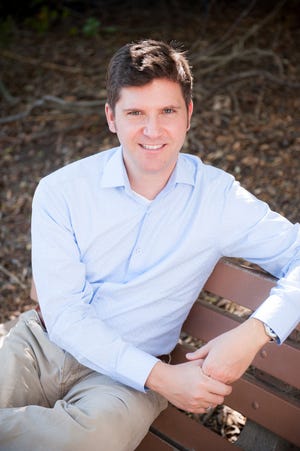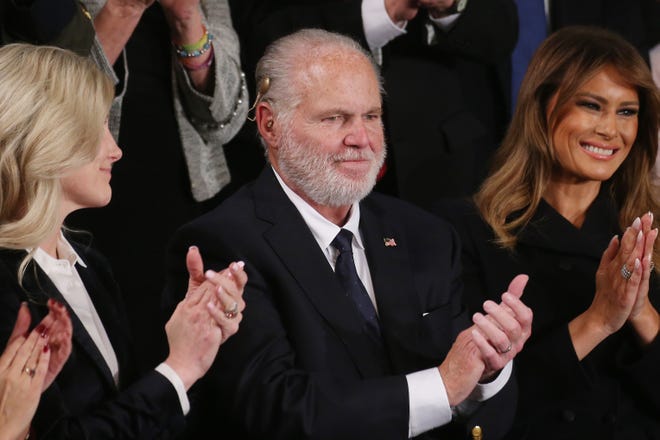Shaping my dad’s view of gay people like me
My father began listening to Rush Limbaugh within the Nineteen Nineties, concerning the time he retired as a scientist, whereas residing in Cincinnati. I lived in Washington, D.C., working as a area organizer for nationwide organizations that supported civil rights and sought to depend and punish hate crimes in opposition to what we then known as the gay neighborhood.
By coincidence, Cincinnati was a sizzling spot for efforts by spiritual conservative organizations to cease the motion for authorized protections from discrimination for LGBT people and assaults fueled by bigotry, together with hate crimes, in opposition to us. I had come out to my dad and mom about 4 years earlier. I used to be selective in describing the dangers or threats I skilled, together with a taxi that when began to drive off with my then-boyfriend’s hand on the deal with.
I used to be additionally deeply concerned within the 1993 marketing campaign in Cincinnati in opposition to a measure, Issue 3, to amend town constitution to forbid any regulation that grants “minority or protected status … or other preferential treatment” to gay males, lesbians or bisexuals. The measure, the main focus of a divisive marketing campaign crammed with harsh invective over race and sexuality, handed with 62% voter support. My dad and mom occurred to maneuver to town the next yr, as courts and the neighborhood handled fallout from the constitution modification.
Dad’s every day rendezvous with Limbaugh
My mom professed concern for my security, although it wasn’t clear whom she held answerable for threats to her son. Was it unnamed, imagined bullies who would possibly goal me on a sidewalk or in a gasoline station or car parking zone and lash out with homophobic violence? Or was it me, for defying notions of spiritual piety and conformity she held expensive and being unafraid to name myself a gay man?
At the time, worry of AIDS and transmission of lethal HIV was interwoven with gay id, like the double helix of DNA that researchers had been then untangling. For people like my mother, this stigma clouded the impulse towards compassion. It raised for her an uncomfortable query she a few times put into phrases: Was I bringing hostility on myself?
My father was a distinct story, with justifications extra blunt and biting for his disapproval. In 1995, Cincinnati metropolis council members had been deciding whether or not or to not repeal town’s hate-crime ordinance that the brand new constitution modification appeared to disqualify. I used to be visiting them and determined to ask my dad how he would have voted on Issue 3 had he arrived within the metropolis simply a short while earlier.
He by no means answered instantly. But the language he used — “I don’t want a gay agenda forced on me” — made clear his contempt. I challenged him about the place the use of pressure was truly coming from, citing statistics that confirmed harassment and violence in opposition to LGBT people was a rampant hazard and worsening in some states. I additionally challenged him about the place he received his data. Again, I didn’t get a direct reply. Circling again to my mother, I discovered a probable supply: His every day rendezvous with speak radio host Rush Limbaugh.
Scathing criticism of “homosexuals” was Limbaugh’s constant textual desire for on-air therapy of LGBT people. He mocked gay men who died of AIDS. He promoted the false narrative that gay males recruit kids for intercourse, telling Playboy, “I do think that if you get hold of people young enough and attempt to sway them, that homosexuality can be steered into them.”
Don’t have fun anybody’s dying:Be better in Rush Limbaugh’s death than he was in life. Say nothing.
This is what my dad imbibed frequently. Limbaugh’s try at reversal of victimhood — that it was heterosexual people, not gays, who had been the themes of repression as a result of their authority to lash out at people they despised was restricted by regulation— could possibly be learn within the language of the Cincinnati coverage itself. Limbaugh repeated the false accusation used to win passage of the regulation: that by making an attempt to cease discrimination, gay people sought privilege, or “special rights.”
Painful questions for my dad and mom
In one of Limbaugh’s most harmful turns, he questioned whether or not Matthew Shepard, a 21-year-old gay man whose assailants went to jail for his killing, was the sufferer of a hate crime. Shepard’s murder in Wyoming in October 1998 garnered the eye of the nation.
It was this strand of Limbaugh’s anti-LGBT assaults — mixing hate and disinformation — that prompted me to ask my dad about his allegiance to Limbaugh in private phrases.

I wished to know the way far he would go in believing Limbaugh’s distortion. “He is saying gay people like me deserve violence. And you support him. So, when is it too late to turn back?” I requested. “Is it when your son, when a member of your own family, suffers harm at the hands of a hateful person?” I couldn’t permit my mother or dad to look away from the chance that an attacker would possibly take an added sense of permission from a purveyor of ignorance and cruelty, aired to tens of millions of Americans every day by a community of radio stations, who strengthened devaluation of lives like mine.
I don’t bear in mind getting a direct reply to my query from my dad. But within the ensuing years, he did battle to make amends and to point out he cherished me.
Unsafe:What JK Rowling should know about a transgender woman like me: Every day in public is risky
Progress has come incrementally. In 2001, my mom volunteered alongside me to defeat a constitution modification much like Cincinnati’s in my hometown of Kalamazoo, the place she and my dad had moved again. In 2004, Cincinnati voters repealed Issue 3. In 2009, the federal invoice to punish anti-LGBT hate crimes,named in part for Shepard, lastly grew to become regulation.
Today, my dad and mom are going sturdy, thanks largely to the care of my sister — who didn’t allow them to purchase into Limbaugh’s falsehoods that “the coronavirus is the common cold, folks.” Well into their eighties, they welcome my partner fully as part of the family. Whenever I call them by phone, my dad or mom turns off or puts on mute their preferred Fox News. Rush Limbaugh no longer echoes in our relationship. But his legacy has shaped it, while also inadvertently instilling in many LGBT people throughout America a remarkable form of resilience.
Hans Johnson is a longtime columnist on LGBTQ rights and an advocate on state and federal coverage, advising or aiding poll measure campaigns in additional than 25 states. He lives in Los Angeles.





